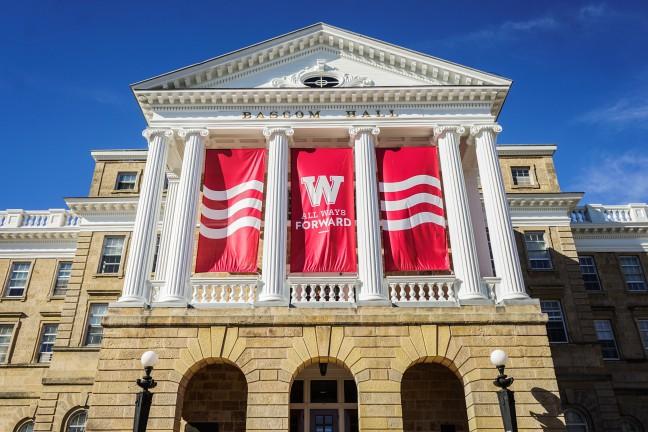The University of Wisconsin recently announced the winners of its Outstanding Undergraduate Returning Adult Student Awards. These awards were created to acknowledge the unique challenges and experiences faced by undergraduate students of non-traditional ages.
Chair of the award selection committee Sybil Pressprich said to be nominated for the award, students must be senior undergraduates returning to school after a significant educational interruption — one spanning at least five years. They must also demonstrate academic success.
“Returning to school is challenging for non-traditionally aged students and for their families,” Pressprich said. “This award is a way to recognize the achievements of returning adult students and to encourage and support them.”
This year’s two award winners are Olivia Wine and Aysha Dominguez. Pressprich said they were chosen for their willingness to get involved in their community and go above and beyond both in and outside the classroom.
Dominguez is double majoring in political science and international studies and plans to teach high school. After she graduates, she will be attending graduate school for curriculum and instruction.
Pressprich said what stood out most about Dominguez’s application was her dedication not only to her studies, but also her community. On top of commuting all the way from Beaver Dam, she leads a Girl Scout Troop, presides over a youth soccer club, leads a Destination Imagination team and is involved with a youth hockey association.
Adult student’s dedication to education sets example for nontraditional students
“Aysha impressed us with her ability to balance a very busy family life with her coursework,” Pressprich said. “ She has three kids who are involved in a number of activities which requires her time and attention. So her contribution to her community is amazing.”
Dominguez said, however, that her journey back to school has not been easy. Her husband suffered a back injury from a work explosion that left him with PTSD. Additionally, money constraints made returning to school difficult — she said there were times she could not find the funds to fill her car with gas to commute — yet she persevered.
Dominguez described the importance of both family and her volunteer commitments. She said her biggest fear was that she would have to let go of one of the organizations she worked with, but that was never the case. She learned how to manage her time effectively.
“I am so honored to receive this award.” Dominguez said. “I have worked very hard and am extremely busy in my personal life.”
Wine, the other award winner, is a sociology major with a criminal justice certificate. She found herself returning to school with a specific focus: to learn how to catalyze institutional change and create equitable structures for disenfranchised minorities.
Wine said her work with a local non-profit called Proud Theater set her on this path. She worked with young people who often fell victim to unfortunate circumstances as the product of systemic issues.
Pressprich said what stood out about Wine was not only her passion for criminal justice but also her willingness to challenge both her own and her peers’ worldviews. Aside from demonstrating this determination in her courses and volunteer work, Wine interns at the Dane County Community Restorative Courts on top of working a job.
“In classes, [Wine] will speak up and challenge fellow students, encouraging new perspectives and learning,” Pressprich said.
UW announces Badger Ready program to help nontraditional students, veterans earn their degrees
Wine said the biggest roadblock she faced was convincing herself that she was capable enough to come back to school. After so many years, she said it can be difficult to return to an activity requiring rigorous commitment and skill — not to mention the time commitment.
Like Dominguez, Wine plans to attend graduate school. She wants to attain a masters degree in social and criminal public policy. She said her overall career goal is create more equitable legal structures.
Wine wants to write policy that creates more resources for youth to prevent them from ending up in the legal system. She also wants to help rehabilitate offenders so that they may have an easy transition back into society post-incarceration.
“More than anything, this award is proof that I made the right decision to return to school, and that I may be capable of creating the institutional changes that I find critical for our future,” Wine said.
Pressprich said the challenges both of these women have faced returning to school reflect the barriers most non-traditional undergraduates must overcome.
Aside from financial constraints, returning adult undergraduates often have families to support and other commitments like work and volunteering taking up much of their time. The perfect school/work/life balance becomes elusive.
Ten UW faculty members receive Distinguished Teaching Award, honors unique teaching methods
Pressprich said sometimes these students also have to deal with bad memories from past educational experiences which may not have turned out desirably, leaving them with stunted self-confidence.
They may have to learn again the skills necessary to succeed as a student, like effective study strategies and note-taking. Not to mention they may have to combat a potential disconnect from their peers — Pressprich said students over 25 only make up two percent of undergraduates.
But Pressprich stressed how much this demographic of students can enrich the educational environment with all their experience.
“While a small group, they add so much to the campus. They bring life experience to the classroom and interactions with others and add to the diversity of our campus,” Pressprich said. “Returning adults frequently do very well academically and faculty often mention how they will encourage and support their classmates when working together on projects. Because they often bring work or military or other life experience with them, they bring a wide range of skills and knowledge to the learning experience.”














